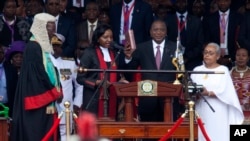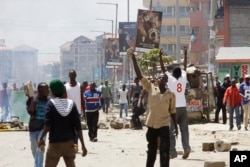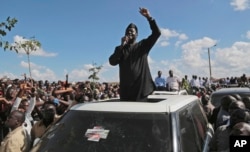After two elections, several Supreme Court petitions, frequent protests and many other twists and turns, Uhuru Kenyatta finally was sworn in Tuesday for a second term as president of Kenya.
“I undertake today to be the custodian of the dreams of all,” said Kenyatta to a packed sports stadium in Nairobi. “And to be the keeper of the aspirations of those who voted for me, and those who did not. I will be president of all.”
After his August electoral win was nullified, Kenyatta won a second election in October with about 98 percent of the overall vote, after opposition leader Raila Odinga told his supporters to boycott the polls. There was 39 percent overall voter turnout in October, leading some to ask whether Kenyatta had earned a mandate.
Showing solidarity
Nick Odhiambo is a fisherman who traveled from the opposition stronghold of Nyanza, in western Kenya, to show his support for Kenyatta Tuesday. Odhiambo says he voted for Kenyatta in the August election, but was unable to do so again in October, after the electoral commission deemed his area too insecure to conduct polling.
“I’ve come here to show my solidarity with His Excellency Uhuru Kenyatta and the deputy president, even though my region could not vote due to some election violence,” said Odhiambo. “But I’ve come here to represent my people and to show we are together with His Excellency the president of Kenya.”
During his inauguration, Kenyatta promised he would "target" 100 percent universal health care, facilitate affordable housing and attract investment. He said any African wishing to visit Kenya will be eligible to get a visa on arrival, and East Africans would be given many of the same privileges as Kenyans, like working, conducting business, owning property and marrying and settling in the country.
Leaders from Rwanda, Uganda, Botswana, Zambia, Ethiopia, Somalia, South Sudan, Gabon, Djibouti, and Namibia were in attendance for Kenyatta's inauguration.
Several people were hurt in a stampede outside the stadium when they tried to force their way inside the venue, and several injuries were reported. Police fired tear gas to control the crowd.
Opposition Protest
And on the outskirts of Nairobi, police fired tear gas at opposition supporters who had gathered for what was billed as a prayer rally held to coincide with the inauguration. The demonstrations quickly devolved into unrest and at least one man was killed.
Rights groups and the Kenyan police have disagreed on the number of people killed in election-related violence since the original August 8 polls. The opposition says there were at least 50. Others have been injured.
The opposition has continued to condemn police killings, asserting that Kenyans have the right to peacefully demonstrate. The government's acting interior minister has responded that not all protesters are peaceful and that the police have used appropriate force against them.
Odinga has not accepted Kenyatta's victory, and said Tuesday that the opposition would be conducting its own inauguration in December.
“We have said, this month, on 12 December, we’ll be having the People’s Assembly which will swear me in,” he said.






